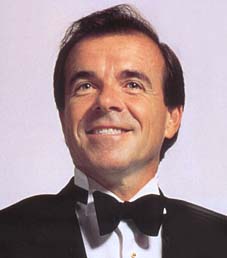


Misha Dichter
Piano interruptus One of the interesting things about great classical music is how the music itself tends to outlive the impressions it leaves on any given generation. Case in point: In the '70s, K-Tel ran commercials for an album that featured "Fantasie Impromptu." Fearing that Chopin's piece would be largely unknown to an audience raised on film and television, the schlock record company marketed the music as the basis of "I'm Always Chasing Rainbows," a pop tune now largely forgotten. Similarly, the great slow movement from Mozart's Piano Concerto No. 20 was dubbed the "Elvira Madigan Theme," a film consigned to the dustbin of Hollywood history.
Misha Dichter will perform
Tchaikovsky's Piano Concerto
No. 1 with the symphonyBy Scott Vogel
Star-Bulletin
"Tonight We Love" is the name of a song that spent 15 weeks atop the 1941 Hit Parade list, its hook based on the moving first theme from Tchaikovsky's first piano concerto, which pianist Misha Dichter will play with the Honolulu Symphony beginning Sunday, the final series of concerts by the orchestra this season. To a first-time listener, the great Russian composer seems to abandon this tune near the concerto's beginning, never to revisit it again. And according to Dichter, even classical music writers often fail to notice the way the opening theme shows up later in the concerto in various guises.
Who: Misha Dichter with the Honolulu Symphony, Samuel Wong conducting IN CONCERT
Showtime: 4 p.m. Sunday and 7:30 p.m. Tuesday
Program: Tchaikovsky's "Romeo and Juliet Fantasy Overture," Piano Concerto No. 1 and Symphony No. 2 ("Little Russian")
Place: Blaisdell Concert Hall, 777 Ward Ave.
Tickets: $15 to $55
Call: 792-2000
"If you look at program notes, 80 percent of them say this: 'After the strings announce the soaring melody at the beginning of the piece, this melody is never heard again.' And that just is not the case," Dichter said as he demonstrated on the piano, by phone, how all three movements of the concerto are based on that theme rearranged. A self-described fan of the "intellectual approach," the pianist enjoys burrowing into well-known classics and unearthing heretofore unknown nuggets of wisdom about their structure. "I'm proud of that one. I showed it to a conductor a month ago, and he almost fell over."
You can imagine how important it might be for a performer to continually reinvestigate material like this, especially when, like Dichter, you have played the piece so often that it has become a kind of signature. After winning the 1966 Tchaikovsky Piano Competition in Moscow (by playing Concerto No. 1 in the final round), keyboard fame and an international concert schedule soon followed. Thus began Dichter's long association with a piece now 125 years old, one he would seem to have played at least that many times.
"It would have been a few hundred more except that I realized about 20 years ago that the piece would greatly benefit if I put it away for a while." As a result, Dichter refused all requests to play the concerto for 10 years, a period during which he focused on the works of other composers.
"First of all, upon returning to it, I thought, well, there's a reason it's so popular. It's wonderfully put together, something that, if I had just been playing it week after week and year after year, I would have lost sight of. I saw it with the eyes of somebody who'd by then been through hundreds of pieces and just tons of chamber music so that I could approach this piece as just another chamber music work rather than an octave machine."
Dichter's characterization of the Tchaikovsky concerto as an octave machine is a reminder that piano playing is not some effete discipline requiring mental effort alone. Like any virtuoso concertos, there are moments in Sunday's piece that, because of the athleticism involved, border on the unplayable. ("The middle of the slow movement has a kind of quick dream sequence that goes by in the blink of the eye, and that's one of the sections which had a few months of my life put into it.") In consequence, Dichter jogs every day and is an avid tennis player; such conditioning comes in handy when playing at high altitudes, something he does each summer at the Aspen Music Festival.
The above description may give the impression that listening to Tchaikovsky requires as much work as playing it. This is far from the case, Dichter said. It can be appreciated by most any audience, even first-time concertgoers.
"It's one of the most beautiful pieces ever written. On any level it will sweep you away," he said.
Click for online
calendars and events.